This Thursday, graduating physicians step forward to begin their professional journeys
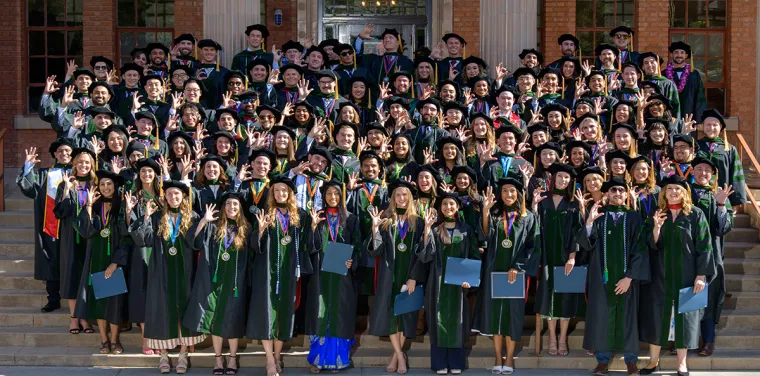
- What: College of Medicine – Tucson Convocation
- When: Thursday, May 11, 2 p.m.
- Where: Centennial Hall and livestreamed at https://vimeo.com/event/3349853
On May 11, nearly 120 University of Arizona College of Medicine – Tucson students will receive their medical degrees in Centennial Hall, where they will take the Hippocratic Oath and be draped with an academic hood to represent their initiation into the field of medicine.
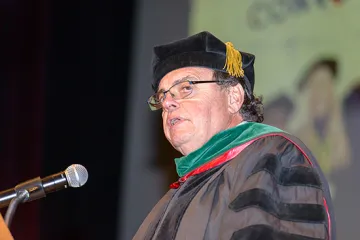
"The Class of 2023 has shown incredible resilience and adaptability in the face of unprecedented challenges throughout their medical education. They have proven themselves to be dedicated and compassionate future physicians, ready to serve their patients and communities with the highest levels of care and professionalism," said Michael M.I. Abecassis, MD, MBA, Iovanna C. Lopez Dean of the UArizona College of Medicine – Tucson. "We are immensely proud of all that they have accomplished and look forward to seeing the positive impact they will make in the years to come."
The newly minted physicians will begin residency training programs this summer, dispersed across 57 hospitals in 25 states. They will pursue specialties in areas such as neurosurgery, dermatology, emergency medicine and family medicine. Two of the graduates participated in the college's MD/PhD dual-degree program and previously earned doctorates.
Nearly 45% of the graduates will remain in Arizona and more than half will go into primary care, important factors in addressing the state and national primary care physician shortage.
"I am especially proud that so many of our new physicians will remain here in our college's residency programs to train at Banner Health and other partner locations," Dean Abecassis said. "Serving Arizona is a critical part of our mission, and we are happy to see so many MedCats remain in our communities."
Additionally, as part of the college's commitment to nurturing culturally competent care, five graduates are past participants in the Pre-Medical Admissions Pathway (P-MAP) Program. The intensive medical school preparation program is designed for students who demonstrate intellect, aptitude and drive, yet have had fewer opportunities to become competitive medical school applicants.
Graduates and attendees will hear welcome remarks from Dean Abecassis, followed by a keynote speech by Melina R. Kibbe, MD, FACS, FAHA, dean of the School of Medicine and chief health affairs officer at the University of Virginia. Todd Vanderah, PhD, co-director of the MD/PhD Dual Degree Program and head of the College of Medicine – Tucson's Department of Pharmacology, will address graduates as the college's 2022-23 Alumnus of the Year. Anthony McCoy was elected by his peers to give the student graduation address. Degrees will be conferred by University of Arizona President Robert C. Robbins, MD, and Dean Abecassis will administer the Hippocratic Oath and deliver closing remarks.
Beyond the MD: Celebrating a variety of graduates
The College of Medicine – Tucson also confers degrees to undergraduate and graduate students, who will be honored in separate graduation ceremonies. On May 12, Bachelor of Science in Health Sciences degrees will be awarded to 275 graduates majoring in physiology and medical sciences.
"Physiology and medical sciences is an incredibly popular program here at the University of Arizona," said Claudia Stanescu, PhD, associate professor and director of undergraduate programs for the Department of Physiology. "This is one of the few programs of its kind in the country that is part of a college of medicine, and our students have access to the expertise of many well-known faculty because of this affiliation. We are proud of this year's graduates, and we look forward to seeing what they accomplish."
Joining the physiology and medical sciences graduates will be eight graduates of the Bachelor of Science in Emergency Medical Services program, launched in 2019. It will be the second convocation ceremony for students completing the program.
"Obtaining a bachelor's degree in EMS is a significant achievement that sets individuals apart in the field. Our program is designed to equip graduates with the advanced knowledge and skills necessary to excel as leaders in emergency medical services," said Joshua Gaither, MD, FACEP, professor of emergency medicine and director of the EMS degree program. "With only a limited number of programs nationwide, our graduates are poised to make a real impact on the EMS community."
The new Bachelor of Science in Medicine will graduate its first student this year. The quickly growing program started in fall 2021 and already has 299 students enrolled in the major, with another 500 expected to matriculate in the fall.
"This program is designed to help students find what path in medicine they want to take. They have the chance to really get to know what these careers in the health care field are about while having the opportunity to learn from medical doctors in their first two years," said Paul Gordon, MD, MPH, co-director of the Bachelor of Science in Medicine program. "I am proud to see our first student earn a degree from this program, and we are looking forward to helping many more follow in his footsteps."
On May 10, 49 students in Bioscience Graduate Programs will receive degrees, including 14 Master of Science and eight doctoral degrees in clinical translational sciences, six Master of Science and five doctorates in cellular and molecular medicine, seven doctorates in immunobiology, five Master of Science degrees in genetic counseling, and three Master of Science and one doctorate in medical pharmacology.
College of Medicine – Tucson students receiving master's degrees and doctorates will gather on May 10 at 7 p.m. in the Health Sciences Innovation Building Forum in a ceremony that is not open to the public. Students receiving medical degrees will gather on May 11 at 2 p.m. in Centennial Hall. Tickets are required and the event will also be livestreamed; for more information, visit medicine.arizona.edu/admissions/annual-event/convocation. Undergraduate students receiving bachelor's degrees will gather on May 12 at 2 p.m. in the Grand Ballroom. Tickets are required. More information about UArizona commencement ceremonies can be found at commencement.arizona.edu.
Meet the College of Medicine – Tucson Class of 2023
Alex Alvarez, PhD: 'I've grown to be more compassionate, more kind, more caring'
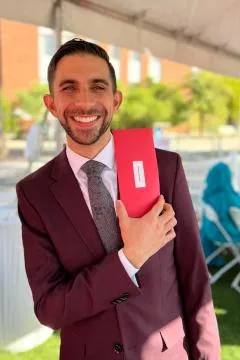
Alex Alvarez, PhD, has spent more than a decade at the University of Arizona, where he earned a bachelor's degree and doctorate in biomedical engineering and is poised to receive his medical degree this week. During his first two years of medical school, his work at the student-run Commitment to Underserved People (CUP) clinic set the stage for what followed.
"The people there advocated for justice in larger ways, as opposed to just doing one-on-one patient care," Dr. Alvarez recalls. When he learned that CUP was severely limited in the number of X-rays it could provide, he helped write a grant for an ultrasound machine, expanding access to this technology for patients and helping medical students receive training on it. This success inspired him to study ultrasound imaging for his doctorate.
"I wanted to learn the ins and outs of ultrasound so that I could develop ultrasound-based technologies that could be used more readily in primary care settings," he says. "There's a huge disparity in the way high-quality diagnostic imaging is accessed by patients. I would love to bridge that gap by creating new devices that are inexpensive, portable and easy to use."
After completing his doctorate, Dr. Alvarez dove into the second half of medical school, which included two clinical rotations on the Hopi reservation.
"Getting to learn from a culture that has been around for so many years has been a formative experience," he says. "A big focus is to take care of the whole community. Getting to see this approach to medicine has been incredible."
His clinical experiences, from CUP to the Hopi reservation, steered him toward family medicine.
"Having variety in the day and seeing so many different patient populations is intellectually stimulating and provides a lot of challenge to continue to learn and grow," he says. He's looking forward to continuing his training at Long Beach Memorial Medical Center in Southern California. "I'm excited to get to integrate in a new community, learn from new patients, new cultures, and understand how to better deliver care."
Dr. Alvarez says he appreciates being able to leave his own mark on the college's culture. He gained leadership experience through his involvement with the Student Diversity Advisory Committee and Med Pride student group, and collaborated with other students to review past lectures, identifying opportunities to design a more inclusive curriculum that creates a more welcoming environment for LGBTQ+ students — and better equips future physicians to treat members of these communities.
"Many clinical departments have had the opportunity to train to be more welcoming in the way they treat LGBTQ+ folks," he says. "I've been proud to be part of this growth."
Likewise, he says the college has played an equal role in shaping who he is today.
"I feel I've grown to be more compassionate, more kind, more caring, and have felt the influence of so many mentors and colleagues," he says.
Thomas M. Cahir, MPH: 'This place really does feel like home'
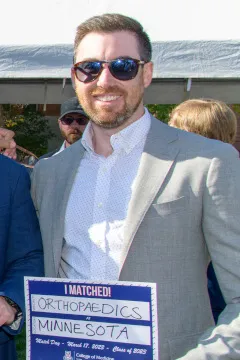
Thomas M. Cahir, MPH, describes himself as "U of A born and bred." He came to the university in 2009 to earn a bachelor's degree in biomedical engineering and stayed on for a master's degree in epidemiology. After a stint as a simulation engineer at the Arizona Simulation Technology and Education Center, he enrolled in medical school.
Originally interested in emergency medicine, a chance encounter steered him toward orthopedics.
"When I was 9 years old, my congenitally short femur was lengthened by two inches," he says. "During my surgery rotation, I ran into Dr. Francisco Valencia, the surgeon who performed the operation. He was in scrubs, I was in scrubs, and we caught eyes. I don't know how, but he recognized me, even though I was probably 15 years old the last time he saw me."
The reconnection led to a research collaboration, in which Cahir used his epidemiology skills to help conduct a study on reducing transfusion rates in patients with cerebral palsy. Working with his former surgeon-turned-mentor gave him a front-row seat to the field.
"I got exposure to the orthopedic world and got to see some surgeries," he says. "The wonder of orthopedics is that it restores people's quality of life, whether it's gardening or playing with your grandchildren. It's so rewarding when you get a patient back to function. You get to share that enjoyment with your patients."
A rotation at the Rady Children's Hospital in San Diego brought him face to face with children he could relate to on a personal level.
"It was cool to see families in the same situation that I was in when I was younger, and get to tell them I was able to play sports in high school," he recalls.
Another significant event that made an impression on Cahir occurred during his surgery rotation, when a patient went into cardiac arrest.
"I did compressions in the operating room. Obviously, the surgeon was the one who saved the patient's life, but being involved in a life-or-death situation was a powerful moment," he recalls. "We discharged him in time to see his daughter's graduation from the U of A. Seeing the progression of care to the point where he got to go live his life felt like all the work was worth it."
This summer, Cahir will begin a residency in orthopedic surgery at the University of Minnesota in Minneapolis, where most of his family has relocated from their hometown of Sierra Vista. He's both excited and nervous about the upcoming move.
"The college has given me so much, so I'm eternally grateful for this place. I've been here for so long, this place really does feel like home," he says. "It's a difficult time knowing I'm finally leaving, but I think it'll be good for me to get out and experience the world."
Justin Kaye, PSM, MS: 'I wanted to be an all-around doctor'
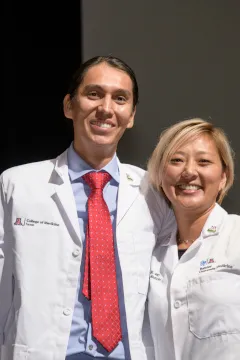
Justin Kaye, PSM, MS, a member of the Hopi and Navajo tribes, grew up in Tuba City on the western edge of the vast Navajo reservation. As a child, Kaye joined his uncle and older cousin, both hatááłii, or traditional Navajo medicine men, to call on tribal members in need.
"That interaction they had with the families was really inspiring. You could tell the families really had trust in them, and they had a say in their care," Kaye recalls.
When Kaye was an undergraduate student at the University of New Mexico, he attended an Association of American Indian Physicians conference, where the prospect of becoming a doctor became a real possibility for him.
"Seeing all the Native physicians, all the medical students, was a breath of fresh air," he recalls. "They had similar backgrounds as me, coming from a small community in a rural town. I was like, 'Wow, maybe I can go into medicine.'"
At the conference, Kaye learned about P-MAP (Pre-Medical Admissions Pathway), an intensive medical school preparation program the College of Medicine – Tucson built for promising students who have faced considerable obstacles. He was accepted into the program, where he met students with similar backgrounds. They became a tight-knit group who supported each another as they prepared for, and ultimately entered, medical school.
His childhood on the Navajo nation helped shape his decision as a med student to pursue the Rural Health Professions distinction track, which took him to hospitals and clinics in small towns across Arizona.
"That experience really solidified what I wanted to do," he recalls. "I wanted to be an all-around doctor and get to really know my community well."
Kaye's experience with the Commitment to Underserved People (CUP) program, a student-run free clinic, also prepared him to reach his goals.
"Having that opportunity to serve patients and think about unique ways to give care in limited-resource settings was wonderful to do as a med student," he says.
He also honed his leadership skills through his involvement with the Association of Native American Medical Students. Along with other members of his campus group, Kaye developed a land acknowledgement statement that now appears in the Health Sciences Innovation Building.
"The statement is a way to connect with Native students aspiring to become physicians, pharmacists, public health leaders and biomedical scientists, showing them, 'You're welcome here. You're supported.' That was our call to the Native students who are thinking about becoming physicians or going into the health sciences."
Kaye is excited to begin his residency in internal medicine at Highland Hospital in Oakland, California. Despite being in an urban center, he believes the safety-net hospital will prepare him to compassionately treat similarly underserved rural patients — which is his goal for his career after residency.
"I'm definitely going to return to the Navajo nation," he says.
Iliana Manjón, MS: 'These past four years were a good opportunity for me to grow'
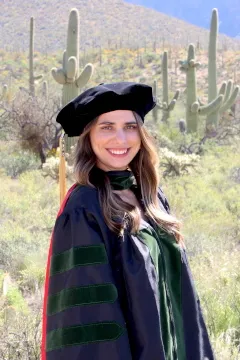
Iliana Manjón, MS, always found psychiatry interesting but was initially unsure about which specialty to pursue as a medical student at the College of Medicine – Tucson. However, her service in the student-run MIND Clinic, a Commitment to Underserved Peoples (CUP) clinic that provides free psychiatric care, swayed her. Further reinforcing her choice to pursue psychiatry was the changing conversation around mental health during the pandemic.
"COVID-19 lockdowns amplified just how important mental health and wellness is," Manjón says. "Our society became more open to talking about mental health, which is incredible, and we're working toward destigmatizing the need for mental health services. That makes this a really great time to get involved in psychiatry."
In her time as a medical student, Manjón spearheaded training and development for the CUP program's telemedicine manuals used during the pandemic, participated in the college's Bilingual Medical Spanish Distinction Track, served as a grief facilitator for the college's Grief Teachings Curriculum and mentor for the college's Peer Mentoring Program, and performed pediatric neurology research at Phoenix Children's Hospital.
"Our research was looking at neonatal developmental and motor outcomes after acute brain injuries" she says. "I've been included in a few publications from my work there, which is really great."
One of Manjón's proudest accomplishments was receiving the Primary Care Provider Scholarship, which includes a commitment to provide care to underserved communities in Arizona following residency training.
"There are a lot of patients in Arizona who are underserved. That's why psychiatry is included in this scholarship," she says. "Increasing access to mental health services is really important to me, and continuing to serve the underserved is the most important part of my future career."
Manjón, who has a master's degree in environmental science from the University of Arizona, plans to integrate environmental psychiatry into her practice. She is currently working with a group at Harvard University to investigate the effects of climate change on pediatric mental health.
"Adolescents are experiencing climate anxiety partially through the growth of information on social media. They're rightfully worried about the effects that climate change has on their own and future generations," she says. "It really does impact mental health."
As she prepares for residency at the University of Arizona College of Medicine – Phoenix, Manjón is excited about the opportunities that psychiatry offers for research, community engagement and advocacy.
"These past four years were a really good opportunity for me to grow professionally and personally, because I had to push myself out of my comfort zone to get to where I am today," Manjón says.
Contacts
Anna C. Christensen

